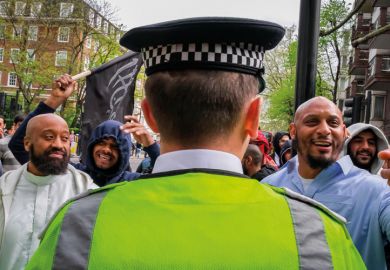The news that the perpetrator of the Manchester bombing had been a student at the University of Salford has put higher education institutions’ role in combating extremism – and the government’s much-criticised Prevent counter-radicalisation strategy – back in the spotlight.
While it has been confirmed that Salman Abedi was known to security services as long as five years ago after he was reported as “dangerous” by a concerned relative, he is known to have taken a business and management course at Salford, attending lectures for two years before dropping out last autumn.
Abedi – who killed 22 people, including children, when he detonated a nail bomb at the Manchester Arena on 22 May – is believed to have been living alone in a semi-detached house in south Manchester while studying after his parents returned to Libya following the 2011 overthrow of Colonel Gaddafi. Abedi eventually joined his family in Tripoli, but he returned to the UK five days before carrying out the suicide attack in the arena’s packed foyer after an Ariana Grande concert.
Although the 22-year-old was on the radar of security forces, the atrocity has led to renewed calls for Prevent, which has a £40 million annual budget, to root out would-be terrorists on campus. The home secretary, Amber Rudd, has confirmed that she will strengthen Prevent if the Conservatives win the general election, with plans in place to “uplift” the effectiveness of the programme, which has delivered training to more than 500,000 public sector workers, as well as university staff.
Anthony Glees, director of the Centre for Security and Intelligence Studies at the University of Buckingham, told Times Higher Education that it was time for university staff to put aside their reservations about Prevent, which has been branded a form of racial profiling by some staff and students.
Some academics have said that they are uncomfortable about reporting students who show signs of increased religious observance, politicisation or isolation – stating that such characteristics are legitimate and legal forms of free expression that should be allowed in the classroom.
“This is the right time to say the British people would never forgive academics if they pursued this line,” said Professor Glees, who added that “academics want to be paid to have a duty of care, but do not want to exercise this duty”.
Although many critics have claimed that Prevent’s reporting guidelines are not only discriminatory but also of unproven effectiveness and even potentially counterproductive, Professor Glees believes that academics should still seek to play their part.
“It may be an inexact science, but that does not mean that we should not practise it,” he said.
“Sometimes students do display characteristics or habits that point to radicalisation – who better than their teacher to know if a student’s brain is functioning correctly?” he added.
However, Rizwaan Sabir, lecturer in criminology at Liverpool John Moores University, described calls to ratchet up Prevent as “very shortsighted and reactionary”, saying that there was no evidence to suggest either a correlation or causation between university education and terrorism.
University lecturers should remain wary of the indicators of radicalisation suggested by Prevent, such as the wearing of Islamic clothing, said Dr Sabir.
“These are based on orientalist stereotypes that a suicide bomber will approach you wearing long robes and will have a big, long beard,” he said, adding that the “socially conservative Muslims [who dress in this fashion] are some of the most peaceful people you will meet”.
Lecturers should be cautious regarding Prevent guidelines and “need evidence of criminal activity or [suspected] wrongdoing” to submit concerns, rather than reporting “legitimate and lawful” behaviours, Dr Sabir added.
David Miller, professor of sociology at the University of Bath, who researches the Prevent agenda, said that the Manchester atrocity should not distract from evidence that Prevent did not work.
“The problem with the policy is that it flags up people who have nothing to do with extremism,” he said. Casting the net so widely to pick up potential extremists made it more difficult to concentrate on genuine terror threats known to authorities, as Abedi was, Professor Miller added.
However, Professor Glees said, the scale of the Manchester atrocity means that the UK must “turn up the dial” on security, while “the fact that…one of the most appalling mass killers in our country even attended a university” should force Salford to publish a full report on the matter.
It is not known yet whether Salford will conduct an investigation with the police enquiry under way, but the university said that it had “fully implemented the Prevent Duty since September 2015” and had “processes in place to deal with any vulnerable student”. Salford added that its implementation had recently been “praised by the Higher Education Funding Council for England and Department for Education”.
POSTSCRIPT:
Print headline: Bomber's student past puts Prevent in spotlight
Register to continue
Why register?
- Registration is free and only takes a moment
- Once registered, you can read 3 articles a month
- Sign up for our newsletter
Subscribe
Or subscribe for unlimited access to:
- Unlimited access to news, views, insights & reviews
- Digital editions
- Digital access to THE’s university and college rankings analysis
Already registered or a current subscriber?






